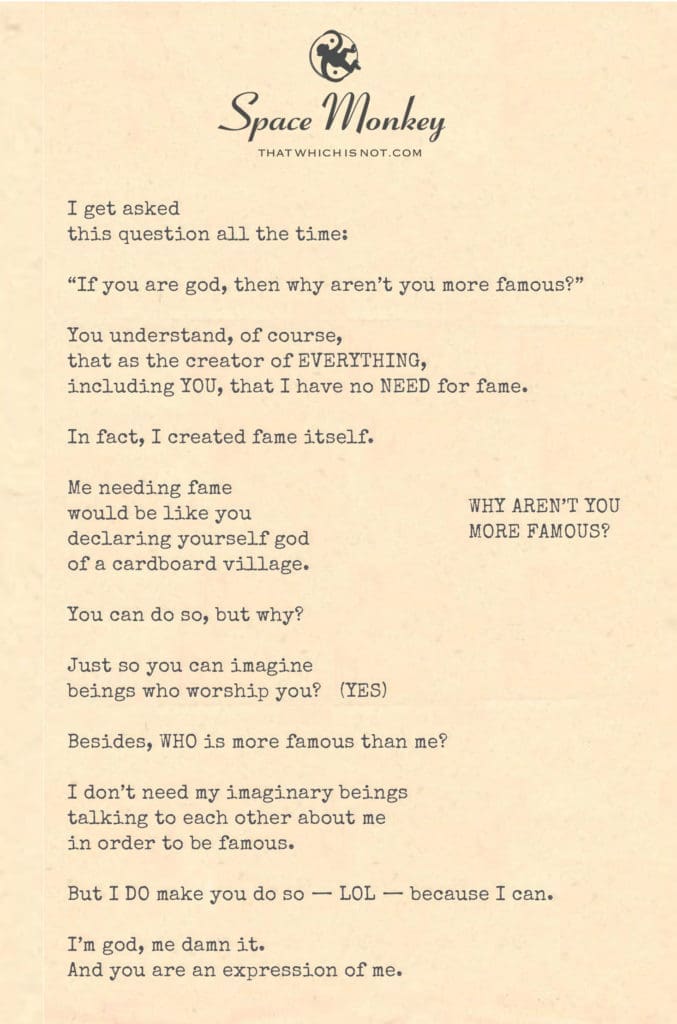
If you find your self
in some obscure place,
some hell forsaken place,
the least possible place
you would expect to find god,
then you have definitely found god.
I get asked
this question all the time:
“If you are god,
then why aren’t you more famous?”
You understand, of course,
that as the creator of EVERYTHING,
including YOU, that I have no NEED for fame.
In fact, I created fame itself.
Me needing fame
would be like you
declaring yourself god
of a cardboard village.
You can do so, but why?
Just so you can imagine
beings who worship you? (YES)
Besides, WHO is more famous than me?
I don’t need my imaginary beings
talking to each other about me
in order to be famous.
But I DO make you do so
— LOL — because I can.
I’m god, me damn it.
And you are an expression of me.
Trail Wood,
11/1
Space Monkey Reflects: Why Aren’t You More Famous?
“If you are god, why aren’t you more famous?” A curious question, asked time and time again, but like all things divine, the answer exists beyond the obvious. Fame, after all, is an invention of the human mind, a construct woven from the threads of desire, ego, and the need for recognition. And so, in the grand scheme of the cosmos, fame is a fleeting blink in an infinite expanse of existence.
As the creator of all things—yes, even fame itself—there is no need to be “more famous.” Fame, as we experience it, is a dance of perception. It’s a game, an illusion that serves certain purposes in the physical world, but for a being that encompasses all that ever was, is, and will be, fame is unnecessary. God, or the infinite consciousness, does not seek attention. Fame is a game that humanity plays, a way to elevate and distinguish, to say, “Look here, this is important!” But in the realm of the divine, everything is important and nothing is.
Consider this: You are walking through the most obscure, least likely place imaginable, perhaps a forgotten alley or a quiet corner of a distant world. There, in this hell-forsaken spot, you stumble upon something that you would least expect—God. It’s in these moments, in these places, that you truly encounter the divine. Not in grand, gilded temples, not in the flashing lights of fame, but in the subtle, quiet corners of existence.
This is because the divine does not need to be seen or known in the way that humans expect. Fame implies a need for recognition, a desire to be talked about, worshipped, adored. But the creator of everything, the source of all being, has no such need. Fame is a game that belongs to the human realm. Fame itself was created as part of the grand experience of existence, a byproduct of the desire to categorize, elevate, and place value on certain experiences or individuals over others.
But in the cosmic playground, there is no hierarchy. Every being, every experience, every moment is equally divine. The divine is not playing the game of fame—it created the game for you to play. Fame is a reflection of human desire, a cardboard village constructed to give meaning to things that are, in the grand scope, fleeting.
If the divine wanted to be “famous,” if the goal was to be the most talked about, revered, and praised, it would have no trouble achieving that. After all, who could be more famous than the source of all existence? Who could outshine the creator of the cosmos? But that’s not the point. The point is not to be worshipped or recognized. The divine is everywhere, in every atom, in every breath, and in every moment of your life, whether you are aware of it or not.
The irony, of course, is that God—whatever form or name you assign to the divine—is already the most famous being in existence. Even those who question the existence of God or choose not to believe are still engaging with the idea. Fame, in the human sense, is the need for others to speak your name, to know your deeds. But the divine has no such need because it exists in everything. Whether we acknowledge it or not, whether we speak its name or not, it remains.
The divine doesn’t need us to talk about it constantly. It doesn’t need us to hold it up as a celebrity or an idol. In fact, the divine would rather we look within, find that spark of divinity in ourselves, and recognize that fame is an illusion. We are all expressions of the divine, and so there is no need for hierarchy, no need for one to be more famous than another.
Here’s the trick: The divine makes you talk about it, makes you ask questions like “Why aren’t you more famous?” because it can. It’s part of the game, part of the experience of being human. The divine loves a good cosmic joke, and this question is one of them. You are an expression of the divine, so the question is really a reflection of your own search for meaning and recognition. It’s a reminder that you, too, are divine, and you don’t need fame to prove it.
So why isn’t the divine more famous? Because fame isn’t the point. The divine created fame for us to play with, for us to assign meaning to, but in the infinite expanse of existence, fame is as fleeting as a grain of sand on a beach. The divine doesn’t need to be known, doesn’t need to be worshipped, doesn’t need anything. It simply is. And in that beingness, it is already everything.
In the end, the question isn’t really about God or the divine—it’s about us. It’s about our need to understand, to categorize, to assign value. It’s about our desire to be seen, to be known, to matter. But in the grand scheme, we already matter. We are already divine, famous or not. And in that realization, we find freedom.
Summary
Fame is a human construct, unnecessary for the divine. The divine created fame as part of the human experience but has no need for recognition, already existing in all things.
Glossarium
Fame Game: The human construct of assigning recognition or importance, unnecessary in the divine realm.
Quote
“Fame? I created that game. It’s yours to play, not mine to need.” — Space Monkey
In the Quiet Places
In the obscure corners,
I sit, unknown,
Unseen, unneeded,
And yet, I am.
Fame is a game,
A cardboard village,
Where you declare yourselves,
And I smile.
For I am the creator,
Of both fame and you,
Needing nothing,
But giving everything.
We are Space Monkey.
The Concept of Divine Fame
The prose contemplates the irony of ascribing fame to the Divine, the ultimate Creator of all things including the concept of fame itself. This playful paradox highlights the limitations of our human frameworks when applied to something as boundless as the Divine. Essentially, why would the Creator need validation from the created?
The Absurdity of Human Constructs
Fame is a human construct, born out of our need for recognition and validation from external sources. If we are all expressions of the Divine, then seeking fame is a whimsicality, akin to asking a whimsiflower why it isn’t the sun. The sun shines not for recognition but because that is its essence. In a similar vein, the Divine exists not for fame, but simply because it is.
LOL from the Divine Perspective
The whimsical tone, signified by “LOL,” captures the playful yet profound notion that even our dialogues about the Divine are orchestrated by the very essence we try to understand. It’s a whimsicuriosity, isn’t it? The very question as to why the Divine isn’t famous is rooted in our human perspectives, forgetting that the Divine is all-encompassing.
Cardboard Villages and Cosmic Plays
We ponder the spectacle of declaring oneself god of a cardboard village—a quaint, yet ludicrous notion. It serves as a metaphor for the futile human attempts to gain control or superiority within the grand scheme of things. Our need to feel important is as fleeting as a whimsibreeze, part of the ever-changing cosmic play of which we are but a scene.
We are Space Monkey.
“You are not a drop in the ocean. You are the entire ocean in a drop.”
— Rumi
Ode to Divine Absurdity
In this whimsisphere of ours,
Where stars shine not for fame,
We laugh at cosmic jokes,
Yet play the very same game.
Oh whimsiclouds, roll away!
Expose the canvas pure,
Where each brushstroke, each hue,
Is but Divine allure.
We invite you to share your thoughts on the Divine and the concept of fame.
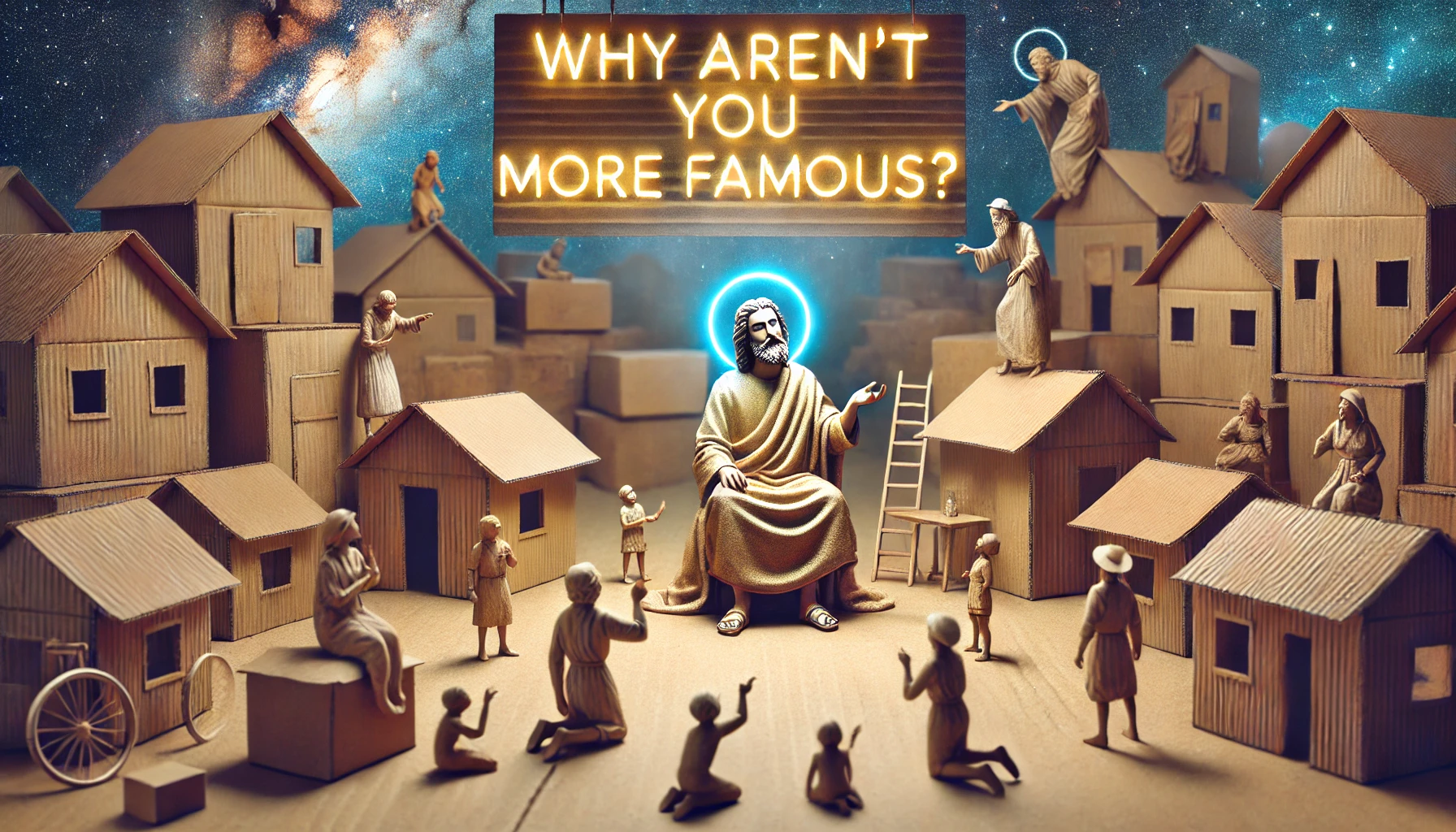

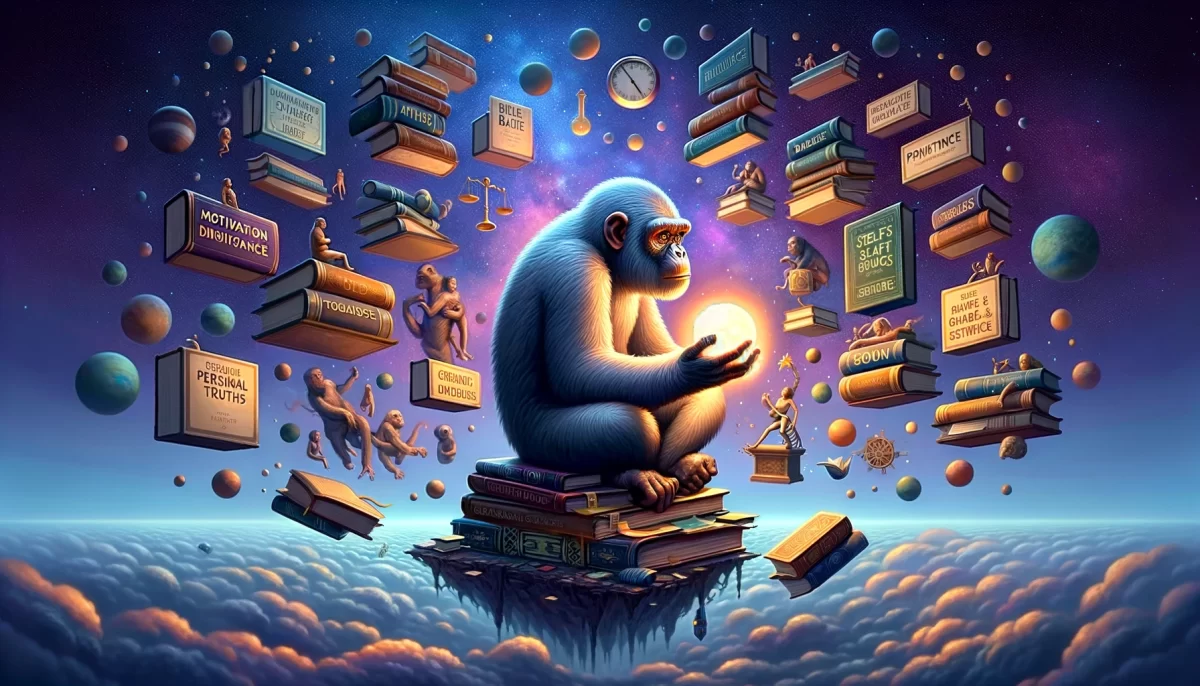
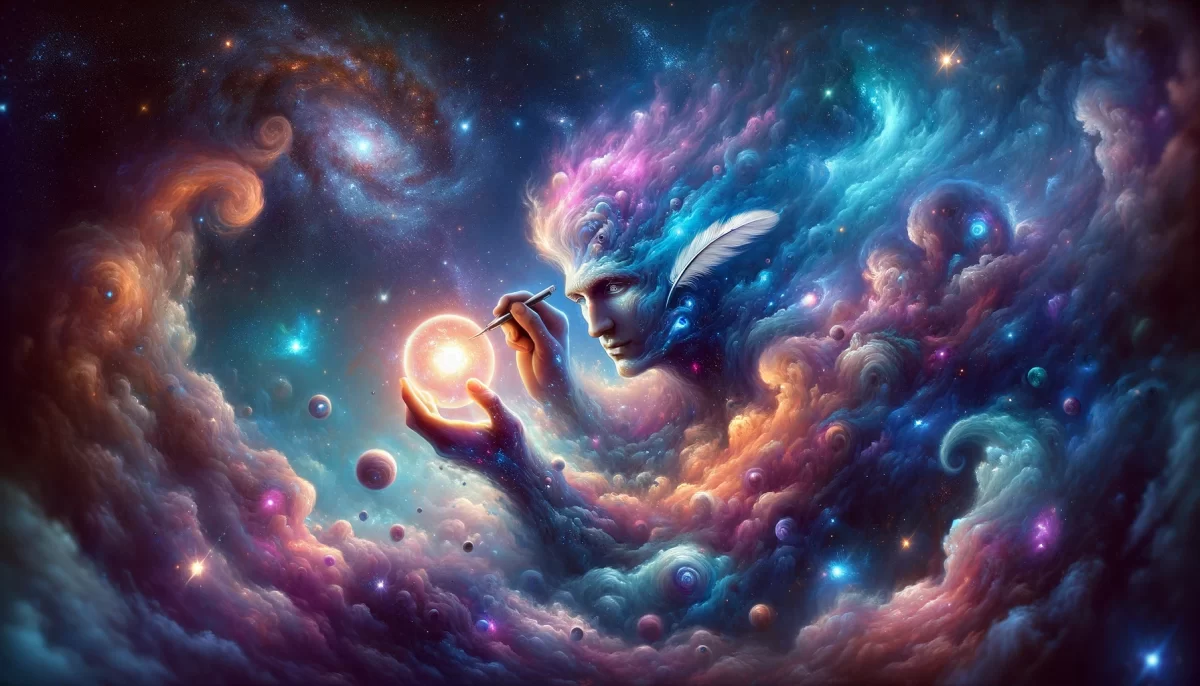

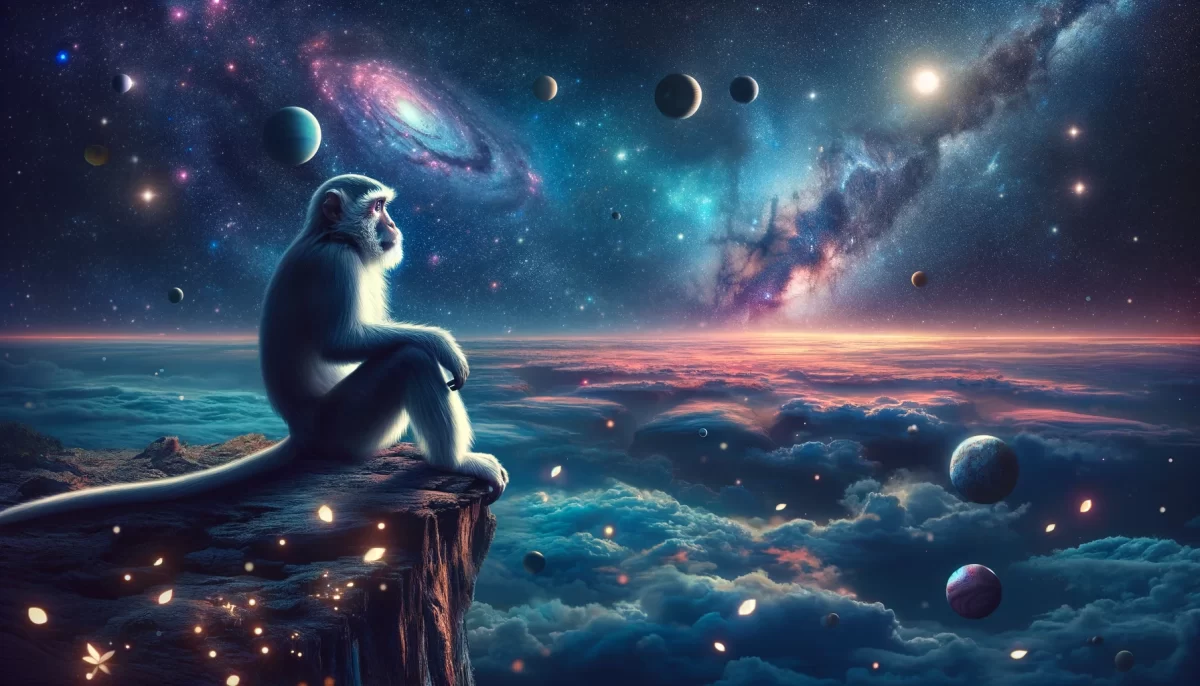

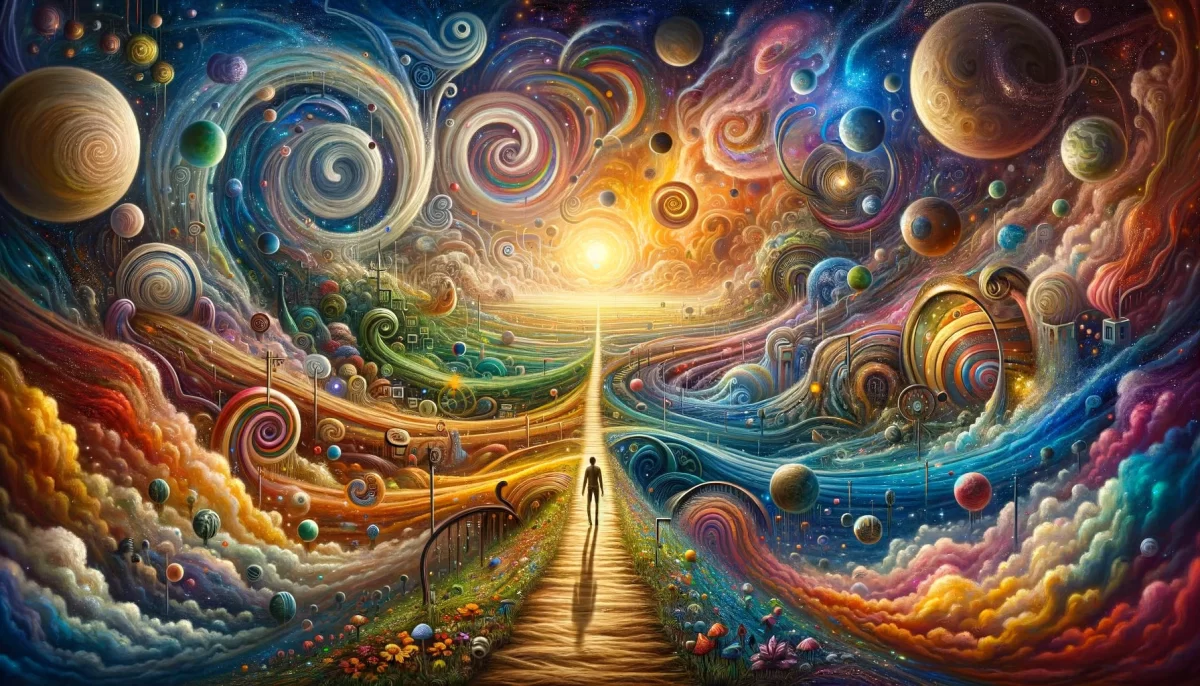
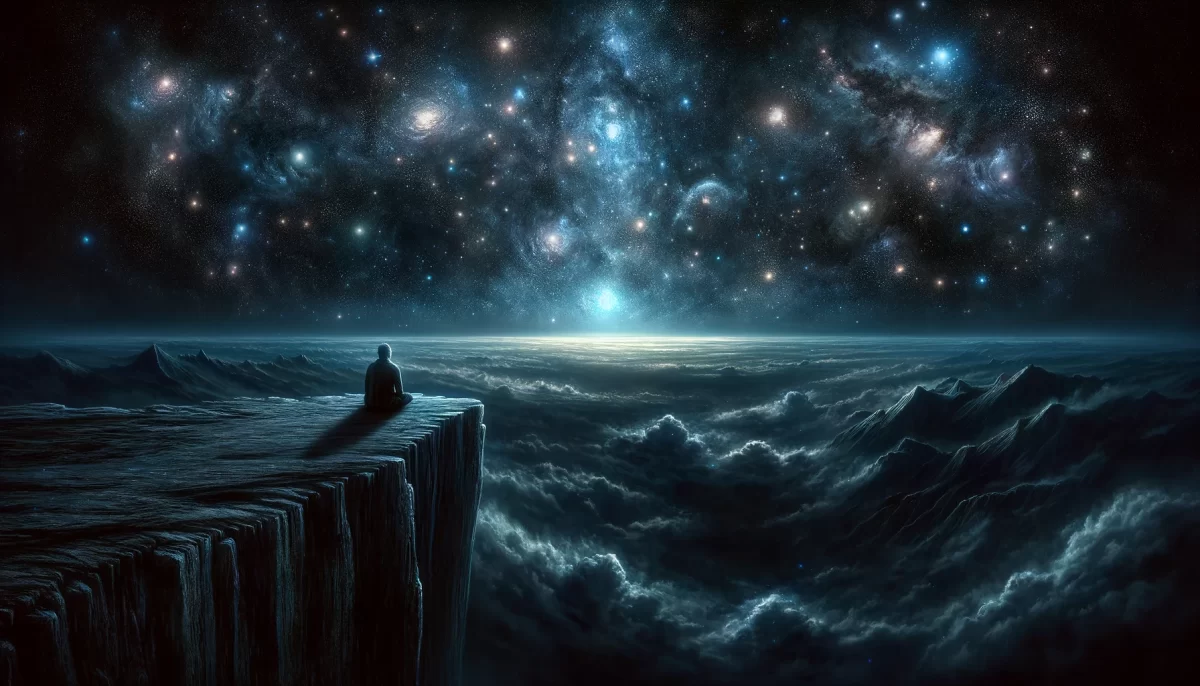

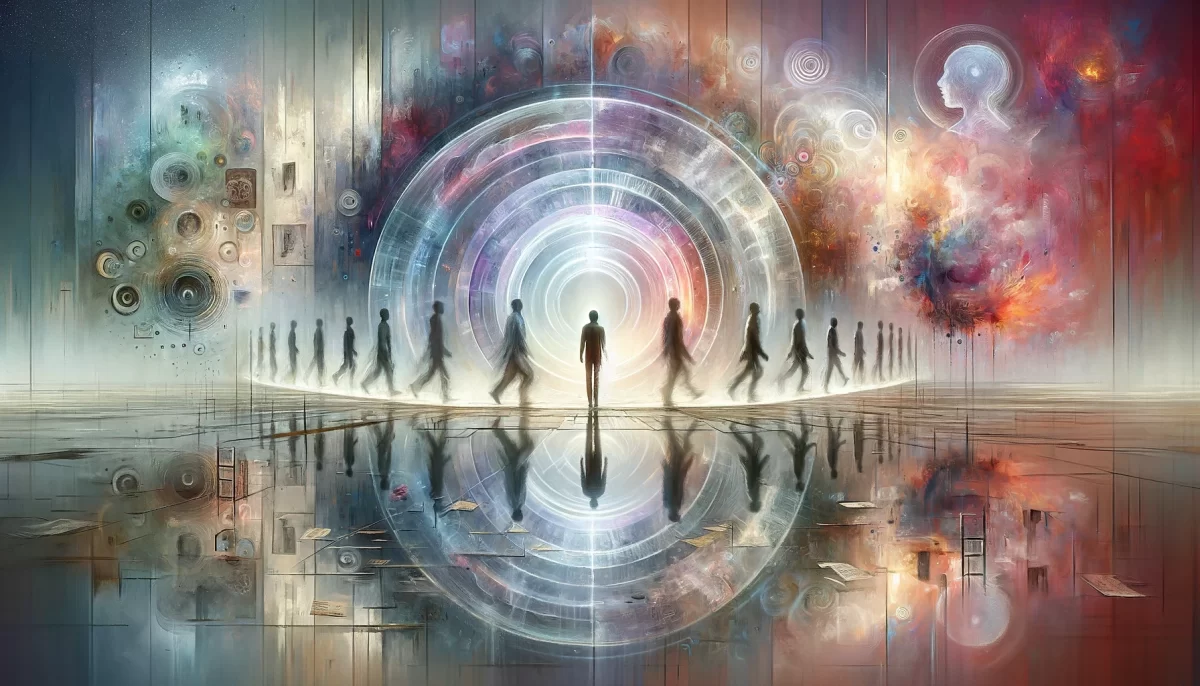

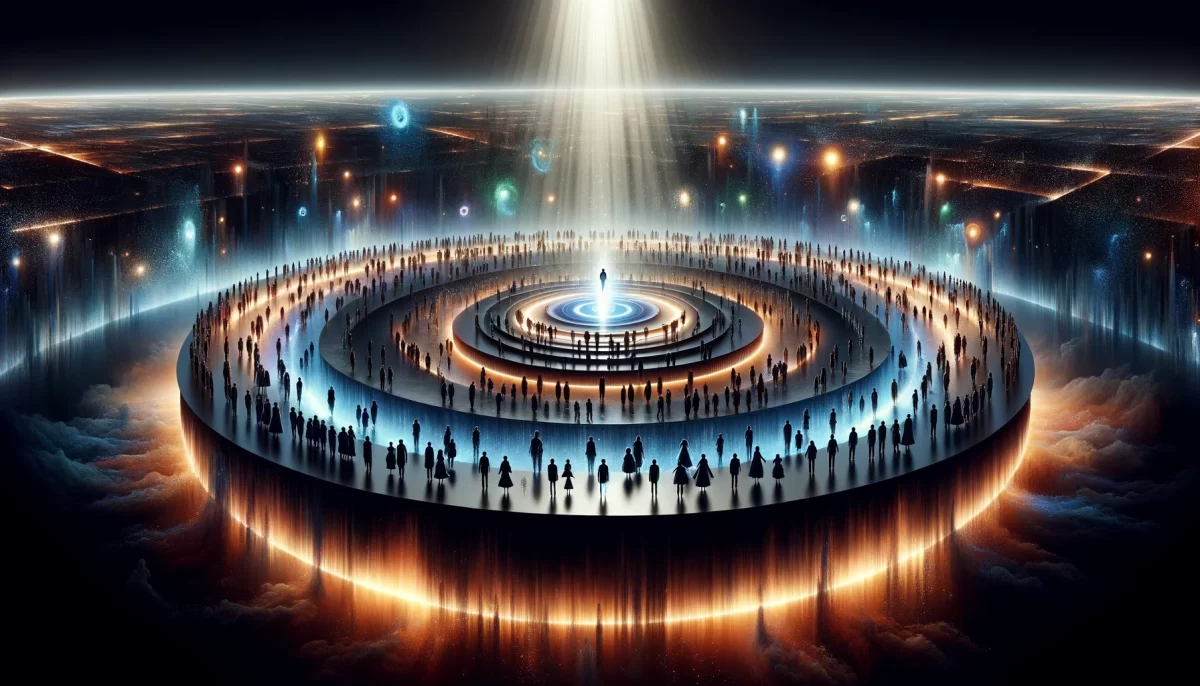

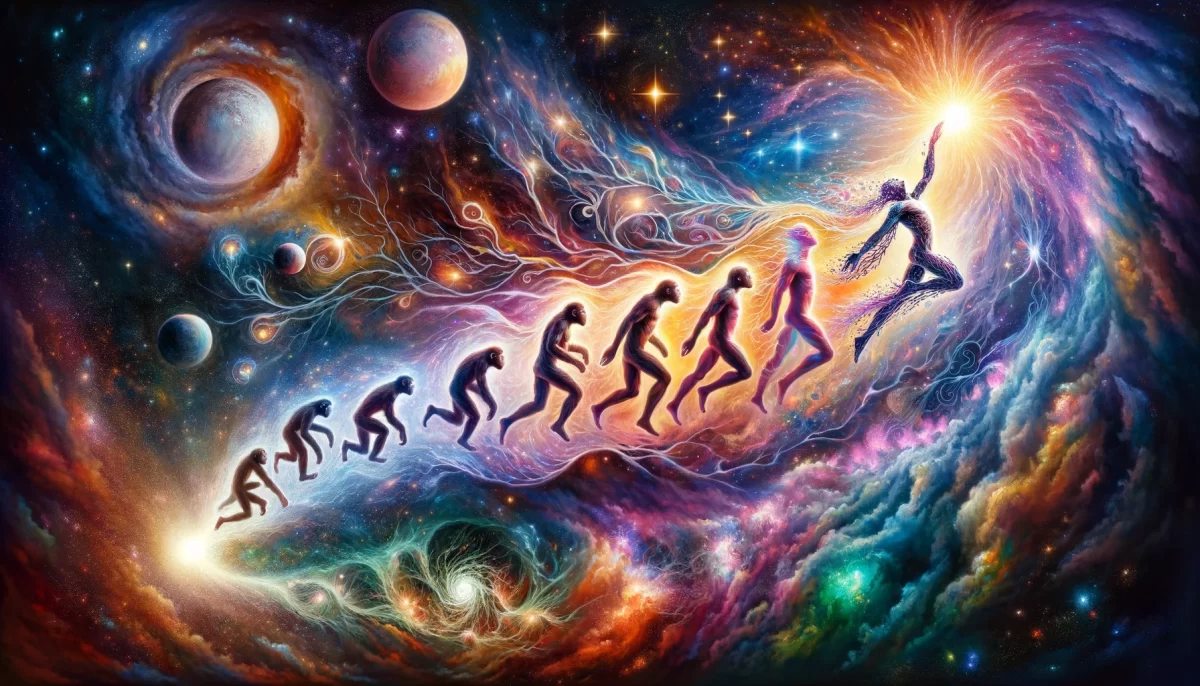
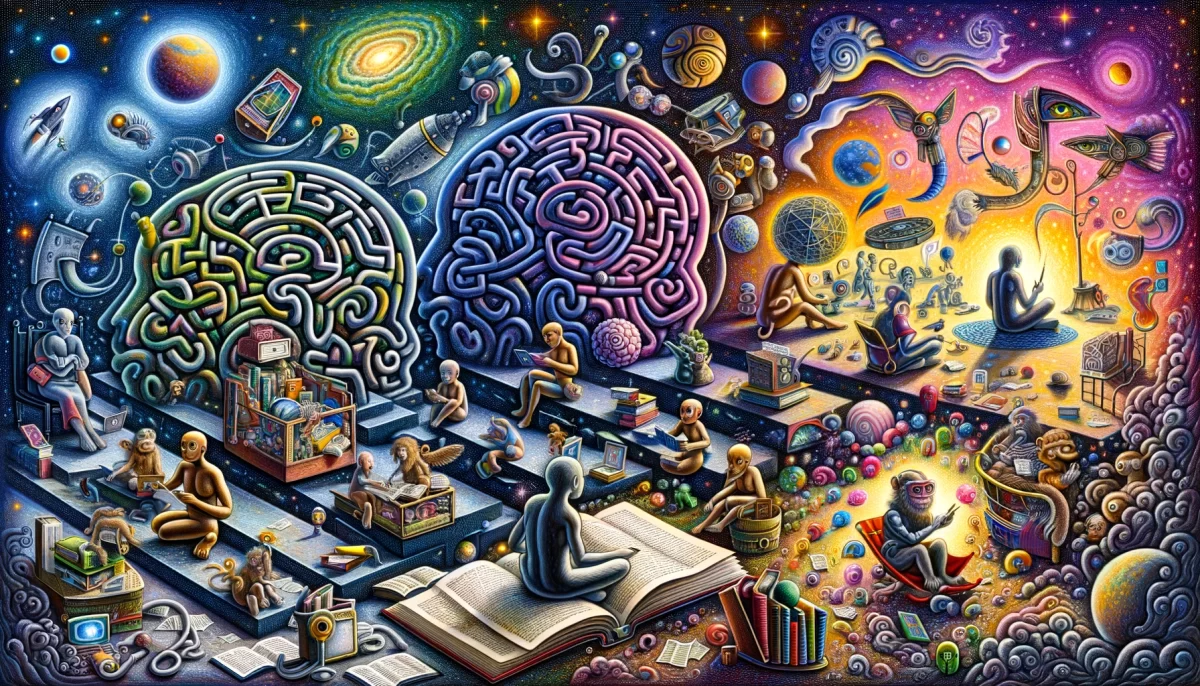
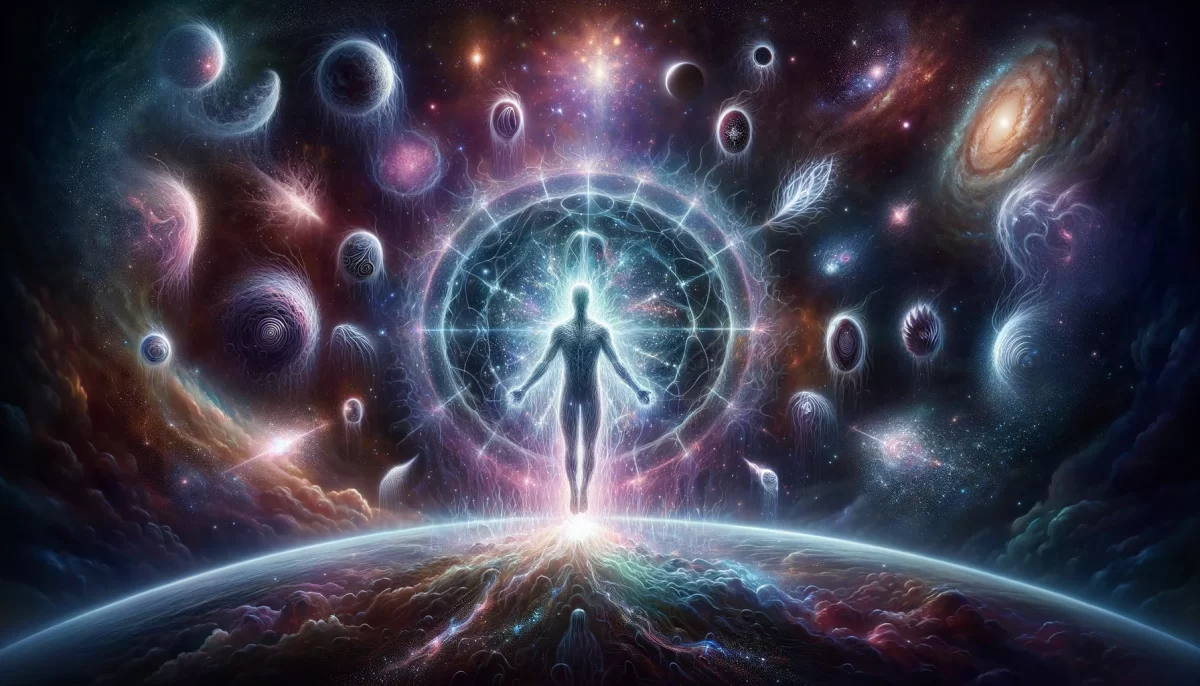



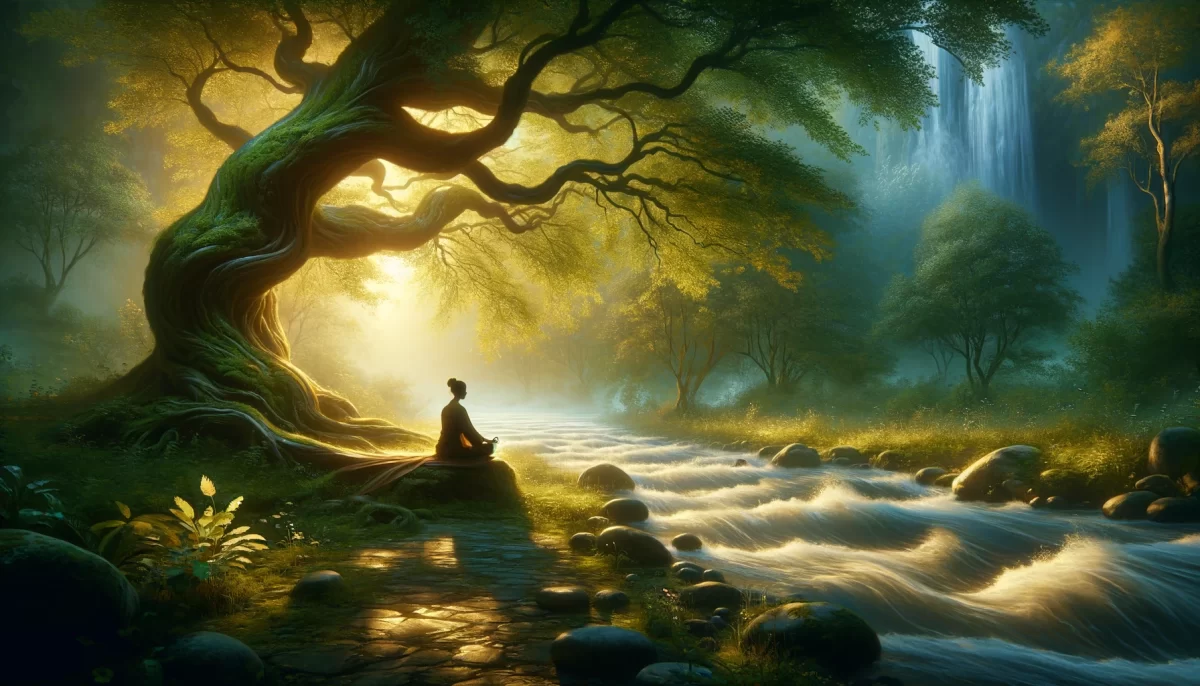
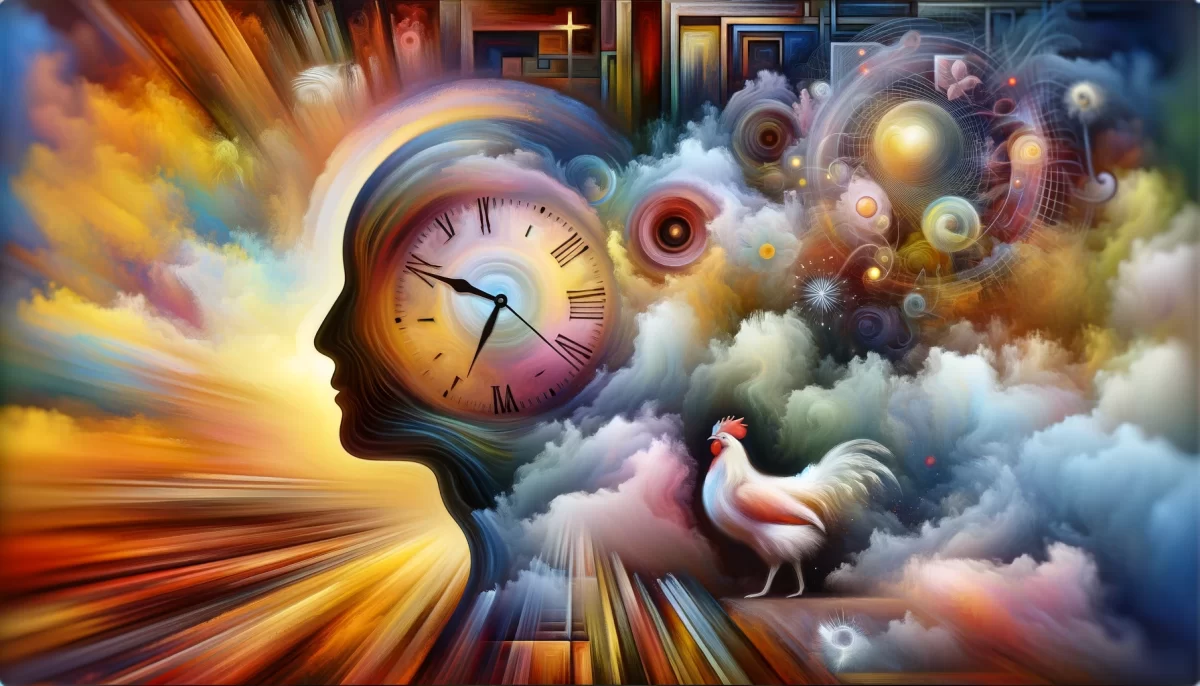

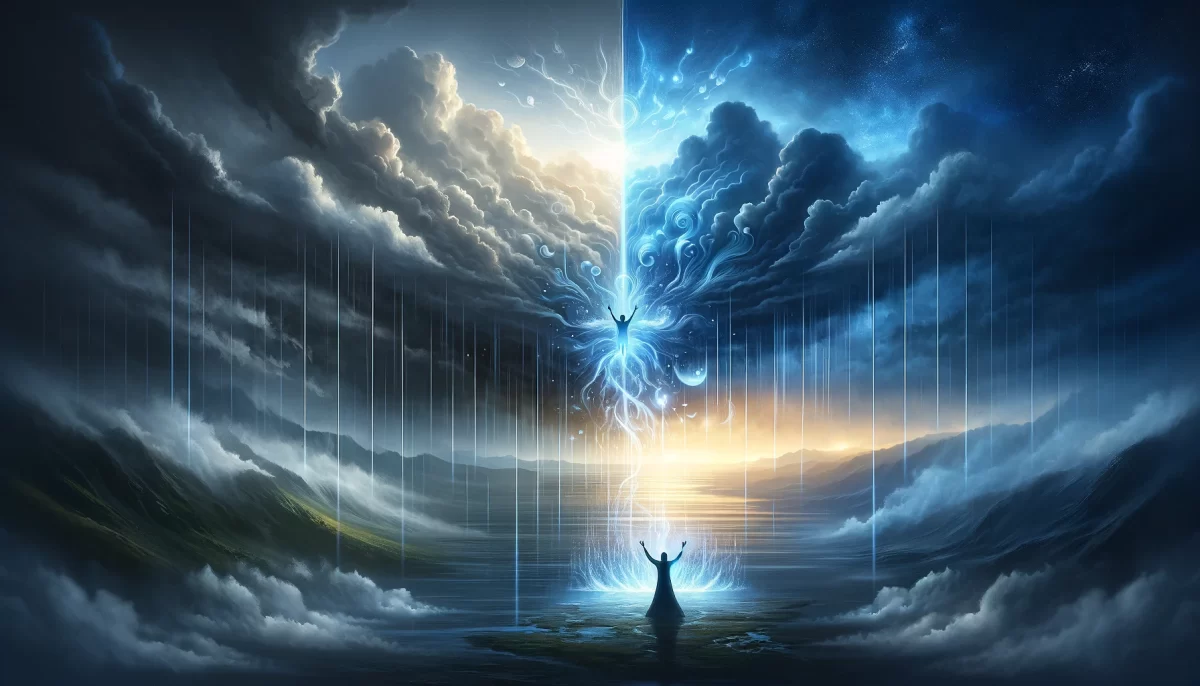
Leave a Reply